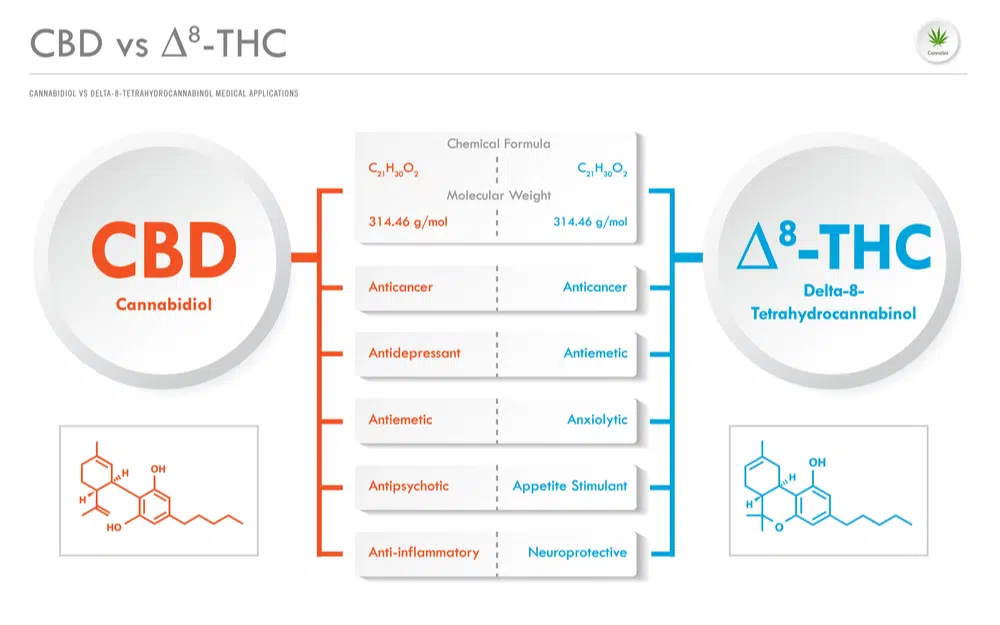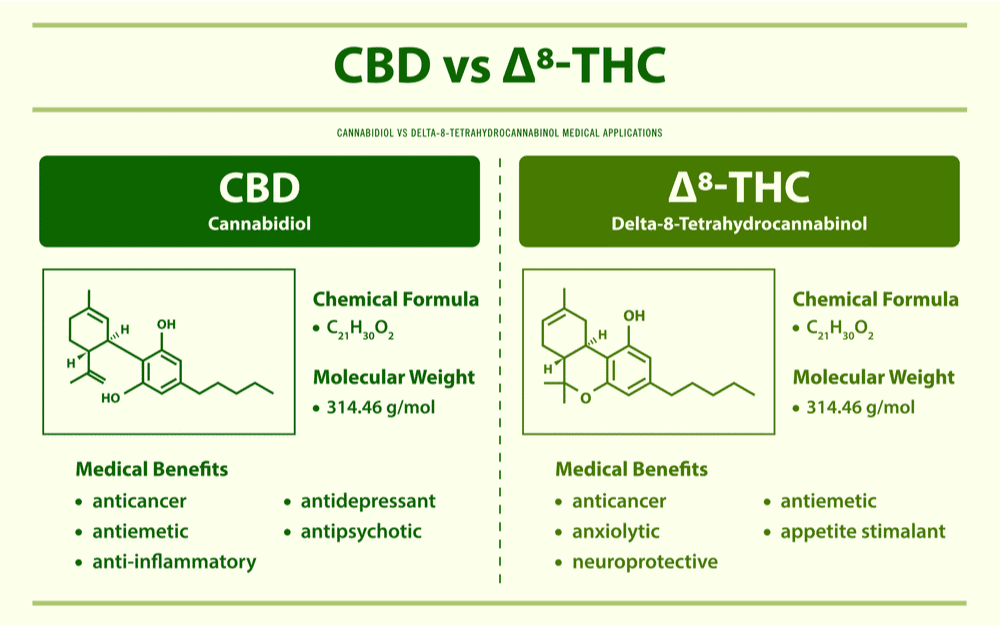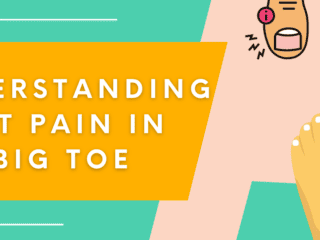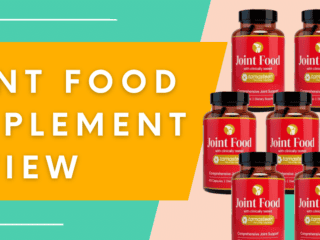With the popularity of the CBD and hemp industries skyrocketing, products containing delta 8 seem to be flying off the shelves faster than they can be restocked.
Delta 8 is a type of cannabinoid that’s a cousin of the commonly known delta-9-tetrahydrocannabinol, otherwise known as THC.
Producing similar effects to THC on a less intense scale, delta 8 is in high demand for its ability to give you what people are calling a âlegal high’.
But is Delta 8 actually considered legal according to federal law? It seems the jury is still out.
This article serves to outline exactly what delta 8 is, how it’s extracted, whether or not it’s legal, and whether it’s safe to take.
What is Delta 8 THC?
Delta 8, also known as D8, delta 8 THC, or delta-8-tetrahydrocannabinol is a psychoactive cannabinoid found in the flowers of cannabis plants.
While marijuana and hemp plants belong to the same classification of the cannabis plant family, delta 8 THC is extracted mainly from hemp plants. Hemp plants naturally contain lower THC levels than marijuana, which has a higher concentration of the delta-9-tetrahydrocannabinol variant.
Delta 8 is found in extremely small amounts and the flowers usually contain less than 1% of the cannabinoid.
Psychoactive substances are drugs that alter the way that your brain functions and can cause changes in your mood or behavior. Common legal psychoactive drugs are caffeine, alcohol, nicotine, and, in some states, marijuana.
Delta 8 is one of the lesser-known cannabinoids found in cannabis plants and is distinct from delta 9 THC in that it produces milder psychoactive effects.
Cannabinoids are made up of hundreds of chemical compounds found in cannabis plants. Two of the most well-known types of cannabinoids are tetrahydrocannabinol, commonly referred to as THC and cannabidiol, or CBD.
The main difference between the two cannabinoids is their effects. While CBD has stronger antipsychotic effects, THC has more potent psychoactive effects.
These effects are what give THC the ability to give you an intoxicating high. CBD is more typically used for its relaxing and medicinal properties.
The Differences Between Delta-8 and Delta-9 THC

Delta 8 shouldn’t be confused with its close relative, delta-9-tetrahydrocannabinol. Delta 9 is a more potent cannabinoid and is found in more concentrated levels in cannabis plants.
Delta 9 is the primary psychoactive drug found in marijuana.
The molecular structures of the two cannabinoids are similar, with both of their molecular chains containing double bonds. The difference between the two is the location of these double bonds.
The double bond is found on the 9th chain in Delta 9, and on the 8th chain in Delta 8, which is what gives them their names.
Your body contains a system of receptors that affect processes such as mood, memory, pain, and appetite. This is known as the body’s endocannabinoid system (ECS).
Of this system, Cannabinoid Receptor type 1, or CB1, is responsible for the mediation of the psychoactive effects of THC. Delta 8 and delta 9 bond differently to CB1. Delta 8 produces a more clear-headed high, while delta 9 is known more for its negative effects on mental processes.
Delta 8 also has a more stable molecular structure because of the position of its double bond.

How is Delta 8 Extracted?
Cannabis plants can contain around 80 to 100 cannabinoid compounds. These compounds are extracted from plants that have been classified as industrial hemp. Industrial hemp is defined as any cannabis plant containing a dry weight percentage of less than 0.3% THC.
The flowers of these cannabis plants are harvested, dried, and cured before the cannabinoids are extracted. Because delta 8 and delta 9 are isomers, delta 8 is extracted through isomerization.
Isomers are compounds with the same or similar components, and so through the extraction process, CBD is chemically rearranged during isomerization to become delta 8.
Because natural extraction methods of delta 8 have higher costs, many companies that produce CBD products use chemical synthesis to extract D8 directly from CBD oils. By doing this they are able to lower production costs.
Why is D8 so Popular?
Companies are able to use cheaper methods of extraction as D8 production is largely unregulated. This results in more affordable products that contain the delta 8 cannabinoid.
The lower price of delta 8 is one of the many reasons it has become so popular.
Another reason is the lower level of THC found in delta 8. Smoking delta 8 gives you a high similar to marijuana, but with better clarity and focus. It seems to produce fewer negative side effects than THC, but the lack of research and evidence on delta 8 has limited the credibility of this claim.
Marijuana users often complain of side effects such as increased paranoia and anxiety, poor motor functioning, delusions, and what is often referred to as “brain fog”.
Brain fog is a state of mental haziness that impairs mental processes like reasoning and motor skills and is a result of delta 9’s rapid effects on the body.
Delta 8 releases more slowly into the body, giving users time to adjust to a more gradual high.
This high is reported to be a more relaxed, euphoric feeling coupled with more mental clarity than marijuana.
The stand-out, and possibly the biggest appeal of D8, could be the ability to obtain a “legal high.”
The levels of delta 8 in edibles, vape cartridges, and other CBD products are extremely concentrated while still being available for sale, removing legal risk for the consumer.
Is Delta 8 THC Legal?
The Farm Bill of 2018 brought about the regulation of the legal production of hemp and hemp-based products. The bill also created a distinction between hemp and marijuana, which had not had a differentiation before.
According to the Controlled Substances Act, marijuana is regarded as a Schedule I substance because of its THC levels.
Schedule I drugs are any drug with the potential for addiction and abuse that has no FDA-approved medicinal use.
Although federal law explicitly classifies marijuana as illegal, it’s still legal for medicinal and recreational use in some states.
Federal law is often contradicted by state law because of the state’s individual ability to create laws surrounding criminal matters. Certain states do not consider the sale of marijuana illegal if it’s sold through regulated vendors.
Similarly, the use of marijuana and THC products in these states is not classified as a criminal act.
This contradiction allows U.S citizens to travel out of state and legally purchase and use marijuana in one state, while simultaneously breaking their own local laws.
Products that contain THC levels less than 0,3% are considered hemp products and are deemed legal. As delta 8 is technically a product derived from the hemp plant, it has become legally ambiguous in comparison to other THC substances.
Because of this loophole, many states have not yet banned or regulated the use of delta 8. This may change due to heavy restrictions or bans already in place in certain states. Other states are also moving towards regulating delta 8.
Delta 8 is restricted or banned in 16 states, including Colorado. This is surprising considering the state’s early legalization of marijuana for recreational use and the cannabis tourism that followed this decision.
Colorado legalized marijuana for recreational use as of December 2012 and had already legalized it for medicinal use back in 2000. In early 2014 the state also allowed the sale of marijuana and its byproducts by licensed retailers.
Some states such as North Dakota, New York, Oregon, and Alabama are trying to redefine cannabinoids that are artificially derived and place stricter production regulations on these cannabinoids.
Many of these states cite health concerns for poorly regulated products as the catalyst for their decision.
In August 2020, the Drug Enforcement Administration (DEA) announced an Interim Final Rule that’s over for review until October of 2021. The rule states that synthetically derived THC would remain classified under the controlled substances section.
While purchasing and using delta 8 products in accordance with state law is completely legal, you may still not be in the clear. Many companies and corporations administer drug tests to ensure that you comply with company policies.
Because of their lack of ability to distinguish between cannabinoids, drug tests show a positive result when in contact with THC metabolites. This means that delta 8 could potentially cause you to fail routine drug tests.
The ramifications of failing your drug test will depend on company policy, as well as state law due to delta 8’s unregulated status and questionable legality.
States That Have Regulated or Banned Delta 8
States that already have regulations on delta 8 are:
- Alaska
- Arizona
- Arkansas
- Colorado
- Connecticut
- Delaware
- Idaho
- Iowa
- Kentucky
- Montana
- Mississippi
- New York
- North Dakota
- Rhode Island
- Utah
- Vermont
- Washington
There are currently 5 states reviewing regulations for delta 8, which could bring the number of states restricting its use to 21. These states are Alabama, Illinois, Michigan, Oklahoma, and Oregon.
U.S. Hemp Authority
The U.S Hemp Authority is an organization that creates and implements regulations and standards within the CBD and hemp industry.
The organization also has a certification program in place to certify hemp products. Consumers and retailers can use these certifications with confidence to ensure that products are of a high standard and as a way of properly educating themselves on hemp and hemp-based products.
With the increase of CBD products containing delta 8 cannabinoids, the U.S. Hemp Authority has begun to refuse certification of these products and has encouraged companies to stop using delta 8 as an ingredient in hemp products.
Their reasoning is rooted in the irresponsible advocacy of hemp products that are marketed as giving the consumer any intoxicating effects.
Is Delta 8 THC Safe?
Delta 8 production is not currently regulated and very little lab testing is done on products containing D8.
Because of the lack of regulations, delta 8 may contain impurities. Minimal lab testing also means that the health risks and complications of these impurities are unknown and could possibly prove harmful to consumers.
Research into unregulated products being sold by unlicensed companies was done by the Cannabis Council in 2021. The tests performed on the products yielded alarming results.
In the unregulated products, none of them had a THC level of under 0,3%. Many products also contained traces of metals that are harmful and even potentially fatal, including chromium, copper, nickel, and lead.
The lack of research into delta 8 could also prove detrimental to consumers. Using products without proper information and how it could potentially affect them poses a substantial risk to many consumers.
Benefits
Softer High
Although delta 8 is mostly considered a hemp-based product, the traces of THC found in D8 mimic the effects of delta 9 to a lesser degree.
The high experienced from using delta 8 is usually described as a “softer high.” It recreates the pleasant feelings associated with smoking marijuana, but users claim to feel less foggy and experience more mental clarity when using D8.
Delta 8 also gives users a more consistent high than THC.
Possibly Improves Mental Health
Though there is limited evidence to support the claims of the psychoactive effects of delta 8 products, frequent users report using it to improve their mental health.
Because of the pleasant, euphoric feelings experienced, users suffering from depression and high levels of stress use it to relax and boost their mood.
Medical Benefits
D8 can also help with nausea and an increase in appetite. This can be a beneficial effect for chemotherapy patients who experience extreme nausea and vomiting after undergoing treatments.
Cancer patients are also often at risk of losing their appetite when taking medications and can lose extreme amounts of weight as a result. An increase in appetite could help them to maintain their weight and eat a nutritional diet without fear of resulting nausea.
Similarly, delta 8 can help users who experience chronic pain manage their condition without the negative side effects that using delta 9 often produces.
Side Effects
Physical & Mental Side Effects
Side effects that have been noted include feelings of confusion, anxiety, and paranoia. These side effects can be harmful to those suffering from poor mental health.
Other negative effects of using delta 8 that have been reported are numbness, increased heart rate, low blood pressure, and drowsiness. These effects often compound with the feeling of paranoia that some users felt.
Research on delta 8 has been done on animals but has not yet undergone human testing. This means that the effects noted in animal subjects may differ from the effects experienced by humans when using delta 8.
When tested on animals, delta 8 produced a temporary increase in blood pressure but was quickly followed by a slowed heart rate and a sudden drop in blood pressure. The slowed heart rate can be compared to the increased heart rate seen in humans as a measure of just how differently it could affect users as opposed to animals.
When tested on animals, delta 8 was used as a form of pain relief and researchers noticed a decline in pain sensations. The cannabinoid was also applied topically to the skin and produced similar results.
Tolerance
Despite this, increasing amounts of delta 8 needed to be applied or ingested to achieve the same levels of pain relief as the tolerance for the cannabinoid increased quickly.
This could indicate that users taking delta 8 products for pain relief or medicinal use may need to increase their dose to experience a consistent pattern relief. Taking an extended break from THC can also significantly lower tolerance.
To ensure safety when using delta 8 products you should always follow the dosing instructions on the product label and know your limits. CBD products and those containing any THC cannabinoids should always be taken with caution.
The long-term effects of delta 8 are unknown.
Safety Precautions
Look for Reputable Products
Although there are ways of increasing the safety of using delta 8 products, users should know they are not completely risk-free.
When purchasing products containing delta 8 you need to be aware of the number of fake products on the market.
To make sure that you are buying legitimate products you should always check the product labels and ensure that the brand is transparent about its testing processes.
A reputable retailer should be licensed to sell hemp-based products and should use third-party testing to ensure the authenticity of the product.
Lab testing is used to ensure that all products contain only the cannabinoids that are advertised, and avoid any impurities that may result from production.
Start with Smaller Doses
CBD and THC affect people differently and so it is recommended to take a smaller dose and learn your tolerance, especially if you have never used or consumed any products containing D8 or regular marijuana.
Follow Warning Labels
If you are using delta 8 THC it’s also important to follow warning labels. Responsible consumption includes not operating heavy machinery, driving, or consuming alcohol when experiencing the sensations of delta 8.
Consult your Doctor First
You should always consult your doctor before using these products if you are taking prescription medications in order to avoid any negative interactions.






